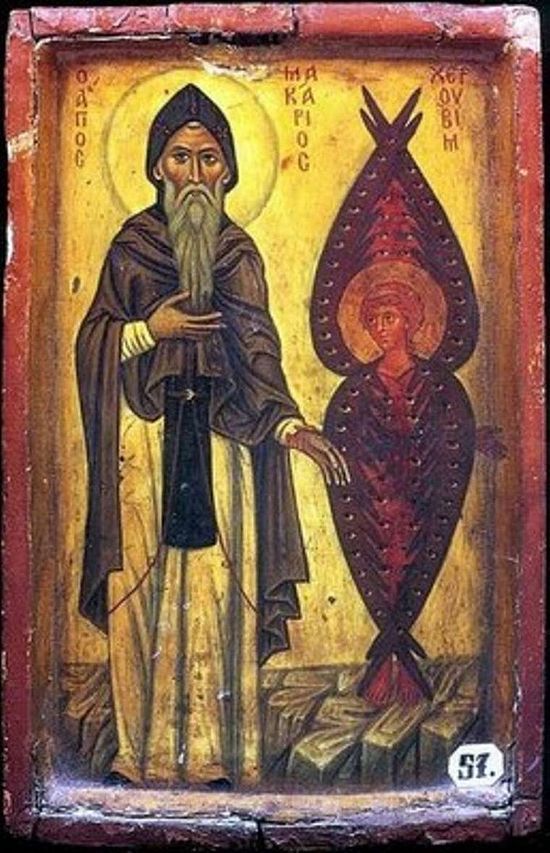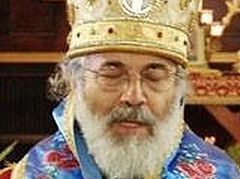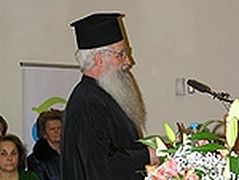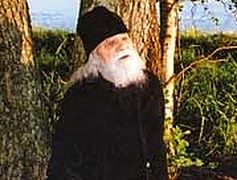Below is a word from Igumen Gregory (Zaiens) on the danger of being too strict, originally appearing in two posts at his blog "Panagia: She Who is Quick to Hear," here and here:
* * *
As we are making our way through Great Lent I would like to share a few thoughts on the dangers of being strict or too strict. And I want to stress that I am only sharing a few thoughts on this subject for it seems to me that a book or volumes of books could be written on this topic. If we err in the opposite way, that is, if rather than being strict we become lazy or negligent we can easily perceive it; but the dangers of being strict or too strict often escape notice. This is probably because there is usually pride behind it; and pride hardens the heart and blinds the mind. In the Proverbs it rightly says: “Pride goes before destruction, and a haughty spirit before a fall” (16:18).
So then, in Great Lent there are the two extremes to avoid, that is, of being lazy and neglectful on the one hand and also of being too strict on the other hand. In addition we can elude both extremes yet still err while observing what is required, by fulfilling the normal expected precepts of the letter. How can we err in the latter? I will leave that off for now and first say a little about being too strict.
Being too strict is an error that is usually the result of the lack of discrimination and always mixed with pride. In short St. Seraphim tells us: “If we willfully exhaust our body to the point that the soul also is exhausted, then such an oppression would be indiscreet even though it may be done to gain virtue” (In the Footsteps of a Saint, St. Tikhon’s Seminary Press 2006, p. 26).
Let us now go on to something more detailed, from the conferences of St. John Cassian we see in the Volume I of the Philokalia a Chapter “On the Holy Fathers of Sketis and on Discrimination”. Here Abba Moses tells of a story when he was a youth. Some elders came to see Abba Anthony (the Great) and asked him which virtue is the greatest of all. All present gave his opinion: some thought it was fasting and keeping vigil, others voluntary poverty and detachment, others acts of compassion and so on. Last of all Anthony pointed out that many who have practiced such virtues had nevertheless fallen away miserably from virtue and slipped into vice.
He then said:
What was it, then, that made them stray from the straight path? In my opinion it was simply that they did not possess the grace of discrimination; for it is this virtue that teaches a man to walk the royal road, swerving neither to the right through immoderate self-control, nor to the left through indifference and laxity. Discrimination is a kind of eye and lantern of the soul, as it is said in the Gospel passage: ‘The light of the body is the eye; is therefore thy eye is pure, your whole body will be full of light. But if your eye is evil, your whole body will be full of darkness’ (Matt. 6:22-3) (p. 9).
Then Abba Moses continued:
This was Anthony’s statement, and it was approved by the other fathers. But in order to confirm what St. Anthony said by means of fresh examples of our own times, we should recall Abba Hiron and how a few days ago, as we ourselves saw, he was thrown down from the height of the ascetic state to the depths of death by the deception of the devil. We know how he spent some fifty years in the nearby desert, following a life of great severity and the strictest self-control, seeking out and living in parts of the desert wilder than those inhabited by any of the other monks there. This same man cast all the fathers and brothers of the nearby desert into inconsolable grief because, after so many labors and struggles, he was deceived by the devil and suffered such a disastrous fall. This would have not happened to him had he been armed with the virtue of discrimination, which would have taught him to trust, not his own judgment, but rather the advice of his fathers and brethren. Following his own judgment he fasted and isolated himself to such a degree that he did not even come to the church for the Holy Pascha, lest by meeting the fathers and brethren and feeding with them he would be obliged to eat lentils or whatever else was brought to the table, thereby appearing to fall short of the target which he had set for himself.
He had already for long been deceived in this way by his own willfulness when, coming upon an angel of Satan, he bowed before him as if he were an angel of light. The angel commanded him to hurl himself, into a very deep well so that he might then know by experience , because of his great virtue and ascetic efforts, that he would never again be subject to any danger. His darkened mind failed to discern who was suggesting this to him, and he hurled himself into the well during the night. Soon afterwards the brethren, discovering what had happened, were only just able to pull him up half dead. He lived for two more days and died on the third (pp. 100-1).
May God preserve us from such and all the snares of the enemy!
As aforementioned, in addition to straying through the extremes of neglect or strictness we can still err while observing what is required, while fulfilling the normal expected precepts of the letter. How can we err? Before giving an answer, I shall first refer at some excerpts from two of our saints, and begin with St. Theophan the Recluse. He writes:
Prayer is the primary work of the moral and religious life. The root of this life is a free and conscious relationship with God, which then directs everything. It is the practice of prayer that expresses this free and conscious attitude towards God…Our prayer reflects our attitude to God, and our attitude to God is reflected in prayer. And since this attitude is not identical in different people, so the kind of prayer is not identical either. He who is careless of salvation has a different attitude to God from him who has abandoned sin and is zealous for virtue, but has not yet entered within himself, and works for the Lord only outwardly. Finally, he who has entered within and carries the Lord in himself, standing before Him has yet another attitude. The first man is negligent in prayer just as he is negligent in life; and he prays in church and at home merely according to the established custom, without attention or feeling. The second man reads many prayers and goes often to church, trying at the same time to keep his attention from wandering and to experience feelings in accordance with the prayers which are read, although he is very seldom successful. The third man, wholly concentrated within, stands with his mind before God, and prays to Him in his heart without distraction, without long verbal prayers (The Art of Prayer, Igumen Chariton, Faber and Faber London 1973, pp. 61-2).
Now let us take another example and have a look at the teaching of St. Paisius Velichkovsky on the Jesus Prayer. We see the following:
I wish to speak also of people who uproot passions. There are those who rejoice when offended, “but because they hope to have a reward. Such a person uproots passions, but not wisely. Another rejoices when offended and feels that the offense was deserved, since he provoked it himself. Such a person uproots passions wisely. Finally, there is such a person who not only rejoices when offended and considers himself blameworthy, but also grieves over his offender’s embarrassment. May God lead us into such a condition of soul! For a clearer understanding of each of these ways of life let us also say the following: the first one, submitting himself to the law, performs only his chanting, while the second motivates himself toward mental activity and always has with himself the name of Jesus Christ for the destruction of the enemy and the passions. One rejoices if he only completes his chanting, while the other thanks God if he performs prayer in silence, without being disturbed by evil thoughts. One desires quantity, while the other—quality. One, as he rushes to fulfill the proper amount of chanting, soon develops a joyful conceit, on which he depends to nurture and grow an internal Pharisee within himself, if he does not hearken to himself. The other, in attaching great value to the quality of the prayer, has an understanding of his weakness and God’s help. While praying, or rather while calling upon the Lord Jesus against the wiles of the enemy, the passions, and evil thoughts, he sees their destruction by Christ’s awesome name and comprehends God’s strength and help. On the other hand being constrained and confused by evil thoughts, he understands his weakness, for he cannot withstand them by virtue of his strength alone. And it is this which comprises his whole rule and his whole life. And although the enemy can suggest joyous conceit and pharisaic thoughts to him as well, he encounters in this spiritual warrior a readiness to call upon Christ against all evil thoughts, and in this way he does not attain success in his wiles (Starets Paisii Velichkovskii, Fr. Sergii Chetverikov, Norland Publishing Company, 1980, pp.166-7).
So we can err by missing the point of our prayers and church services, which is to enter within. As we have seen above in St. Theophan, he who, “has abandoned sin and is zealous for virtue, but has not yet entered within himself, works for the Lord only outwardly”; however, “he who has entered within carries the Lord in himself”. Elsewhere St. Theophan teaches us: “The principle thing is to stand with the mind in the heart before God, and to go on standing before Him unceasingly day and night, until the end of life” (The Art of Prayer, p. 63). Likewise St. Seraphim of Sarov tells us: “The sign of a wise soul is when a man has his mind descend within himself and has activity in his heart” (In the Footsteps of a Saint, St. Tikhon’s Seminary Press, p. 27). Finally, St. Ignatius Brianchaninov has expressed the opinion that in paradise Adam had union of mind and heart, yet this was disrupted by the fall (see The Arena, Bishop Ignatius Brianchaninov, Madras, 1970, p. 85). The Liturgical commemoration for the Sunday before Great Lent is “The Expulsion from Paradise”. Our aim should be to return to the paradise which we lost. Paradise is within, if we descend with the mind into the heart; we shall be at the meeting place between God and man. Amen. So be it.




